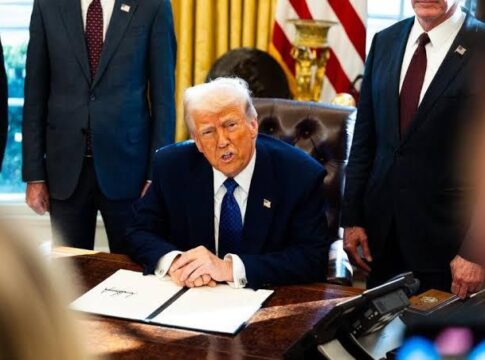U.S. President Donald Trump is pressing ahead with plans to impose 25% tariffs on automobiles, semiconductor chips, and pharmaceutical imports, a move that could disrupt global trade and escalate tensions with key economic partners.
Speaking at his Mar-a-Lago estate in Florida on Tuesday, Trump confirmed that auto tariffs would take effect on April 2, with potential increases on pharmaceutical and chip imports over time. “We’re leveling the playing field,” he said. “Foreign countries have taken advantage of us for too long.”
Auto Industry Faces a Shock
The U.S. auto industry, already grappling with supply chain disruptions, could see major consequences. In 2023, the U.S. imported over $200 billion worth of vehicles, with the EU and Japan among the biggest exporters. The European Union currently imposes a 10% duty on U.S. cars—four times the U.S. rate for passenger vehicles.
READ MORE: Nigeria to Boost Lagos-Kaduna Freight Rail to Full Capacity by Q2 2025
“This would be a game-changer,” said John Bozzella, CEO of the Alliance for Automotive Innovation. “Higher tariffs will raise costs for consumers and strain manufacturers.”
EU Trade Commissioner Maros Sefcovic is set to meet with U.S. officials on Wednesday, aiming to avert a tariff war. Trump, however, has hinted that negotiations may be futile, stating that the EU has shown no willingness to drop its car tariffs.
Pharma and Chipmakers Brace for Impact
Trump also announced potential 25% or higher tariffs on pharmaceutical and semiconductor imports. The U.S. imports nearly $200 billion worth of prescription drugs annually, with major suppliers including Germany, Switzerland, and Ireland. Meanwhile, the semiconductor industry, already facing a global supply crunch, could see further instability.
“The semiconductor industry relies on international supply chains,” said Dan Hutcheson, vice chair of TechInsights. “These tariffs will disrupt production and raise prices on everything from smartphones to electric vehicles.”
A New Trade War Era?
Trump’s latest moves build on his aggressive trade policies. Last month, he imposed a 10% tariff on all Chinese imports over Beijing’s failure to curb fentanyl trafficking. A 25% steel and aluminum tariff is set to take effect on March 12, removing previous exemptions for Canada, Mexico, and the EU.
With global markets already on edge, businesses are preparing for a ripple effect across multiple sectors. Trump, however, remains defiant. “This will bring jobs back to America,” he insisted. “It’s time to prioritize American workers.”




